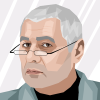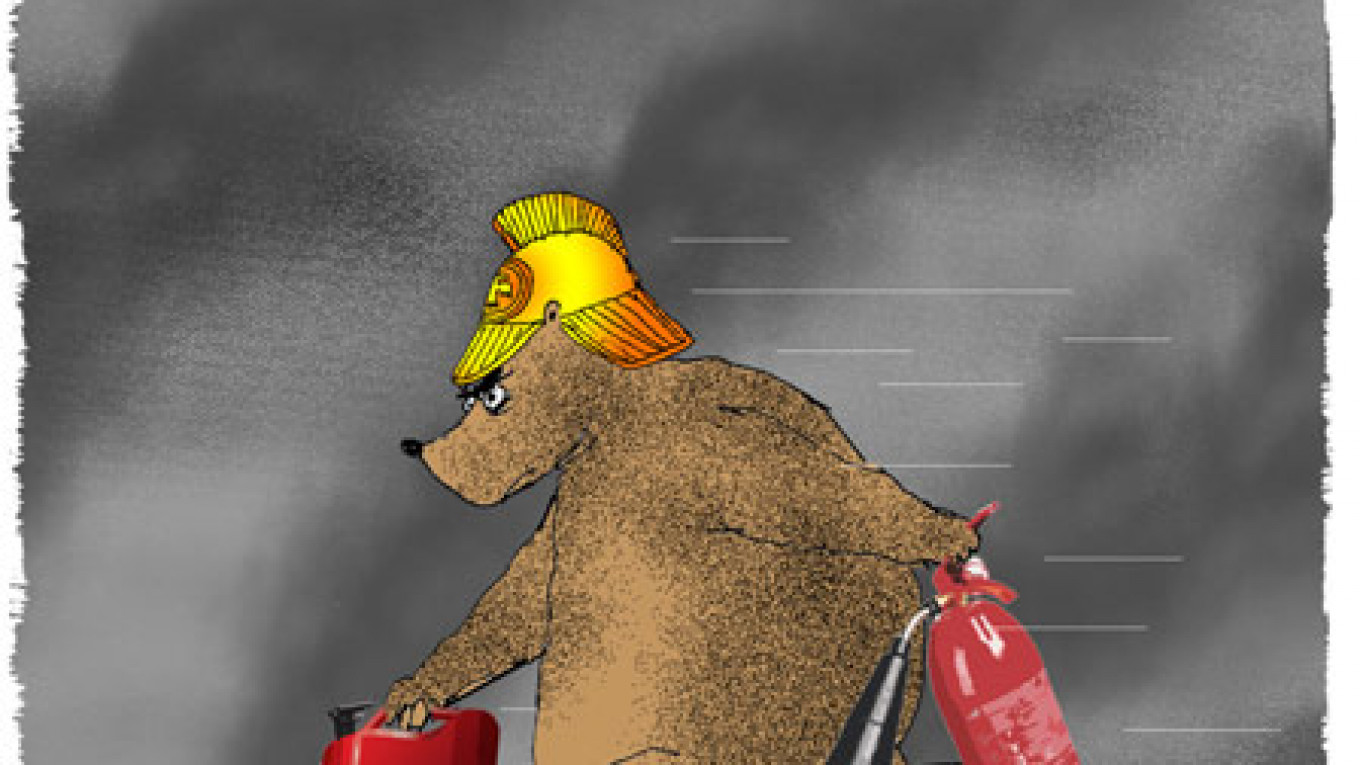Commentators are sparring with one another to explain the reasons for Russia's military intervention in the chaos of the civil war in Syria. Some point to domestic political motives, others to geopolitics, each expounding how it is "Putin's plan." In a way, both are right. Moscow's military action is the latest episode in a persistent pattern of behavior that I call the "System of the Russian Federation" — or "the Russian System" — as it is bigger and older than the current Russian leadership and even President Vladimir Putin.
The world is indeed in a state of chaos and we should be asking what role Russia plays in this: Is it the sponsor of disorder or its beneficiary? The truth is that for contemporary Russia, chaos has its attractions. We help to create crises that spin out of control and then escalate them further — all so that Russia's leaders can be the saviors who protect everyone from the worst outcome.
This behavior stems from Russia's weakness as a world power. Modern-day Russia projects influence by trading everything it can, from nuclear power stations to portable air-defense weapons to caviar. But military conflicts with all their related products, both in the post-Soviet space and — now — beyond it, have been one of the most reliable Russian exports ever since Boris Yeltsin's presidency. For Russia, conflicts are a business.
For the leaders of the "Russian System," the most important goal is self-preservation. But once that is assured, they are in the market for a role in the world wherever they can find it, especially in conflict zones. The only thing they require is that the conflict must at least appear to be resolvable.
The system is effective, destructive and very simple. It works only by simplifying complicated issues. When it hits a strategic impasse, the Kremlin just raises the stakes and escalates the conflict, while also increasing the risks involved. It can only lower the level of risk by reducing the field of play, as it did in Chechnya in the early 2000s, and more recently in the Donbass when it agreed to sign the Minsk agreements. If a conflict cannot be frozen, then you need to submerge it by engaging in a new one — so Syria is following the Donbass.
With its interventions, Russia behaves like a revisionist, not a status quo power. But this is a particular kind of revisionism. Russia waits for others to make the first revisionist step (actions in Iraq or Kosovo, for example) before responding with its own.
In the case of Syria, Russia portrays the Islamic State as the chief revisionist for redrawing the borders of the Middle East made a century ago, even as it embarks on classical revisionist actions of its own. Russia presents itself as the defender of the old norms in defiance of both the Islamic State and the United States, even as it upsets the status quo and creates a vacuum which may not be filled.
Sometimes Russia is capable, reluctantly, of acting in concert with the Western powers, as it did over the Iran nuclear deal. The Russian leadership loves big diplomatic set pieces. But the joint resolution of one conflict is also the occasion to escalate others. A constant feature of the way the system operates is that Russia must always assert the "right" to pit itself against the rest of the world.
Old-fashioned traditional ideology is a genuine component of this behavior. Of course it constrains Russia's leaders from making reasoned strategic decisions, but it makes it easier to provoke conflict, now more outside the country than within it. Ideological fantasies about a secret "world order" created by others allow the Kremlin to believe it is the last defender of truth in the world. If Russia's leaders are compelled to fire cruise missiles, that is because they cannot support the current world order and it is Russia which is setting the new norms of proper behavior.
In Syria, as in Donbass, the model is "hybrid warfare." By firing long-range missiles from small ships on the Caspian Sea, the Russian state sends a simple media message as well as an explosive charge, announcing that Russia has returned to the Middle East with a bang. Intervention in the Syrian conflict also injects a new shot of Russian adrenalin into the veins of the world media, pushing out images of the Russian kleptocracy.
These actions are also meant to keep your adversaries nervously guessing at what your next step might be. So one moment there is speculation that Putin is interested in a diplomatic settlement of the Syrian war, the next analysts are poring over his speech at the United Nations. Then Westerners are shocked by the appearance of Russian bombers over Syria, then by cruise missiles from the Caspian Sea.
As Russia understands it, the "American leadership" that U.S. President Barack Obama and others talk about is a plot to isolate Russia. This means that in Syria Russia has decided to strike a blow not so much against the Islamic State or the enemies of Syrian President Bashar Assad as against "American leadership" in the Middle East.
The plan is for Syria to become a proxy war in which Russia and her allies demonstrate the end of American leadership, and the United States is forced to seek new allies and spend valuable resources proving the opposite. Russia has no interest in a full-scale second Cold War, but a smaller version in the Middle East and presented as such by the world's media will do very nicely as a substitute — despite all the inherent risks.
The game of "near misses" and close encounters between Russian and Western bombers and other aircraft is another part of this confrontation. Giving the other side a scare from time to time is cheap and relatively safe and is also a useful reminder of Russia's massive nuclear arsenal. Every incident of this kind fulfills the purpose of polishing the image of "crazy Russia" and its unpredictable behavior.
All the mistakes and disasters of Russian political life begin when its leaders set out to solve problems elegantly and decisively. The Soviet Union's war in Afghanistan ranks as the prime example of this, but we see it more recently in all kinds of decisions made at the top: Medvedev's "modernization" program, the planned rotation between Medvedev and Putin, and the takeover of Crimea.
Russia is a weak state and its rulers only advertise this weakness by their zigzagging behavior, either failing to make the simplest of decisions or rushing headlong on a mission to tackle an exceptionally difficult problem. This kind of action only reduces everything to a dangerous condition of simplification.
The Russian System will continue to find places to operate across the world and to project Russian geopolitical and symbolic influence beyond its borders. It will do so as long as the world has crises that ask for a military response and the other services the Russian System provides.
Gleb Pavlovsky is president of the Russian Institute. This comment originally appeared on Carnegie Moscow's Eurasia Outlook blog.
A Message from The Moscow Times:
Dear readers,
We are facing unprecedented challenges. Russia's Prosecutor General's Office has designated The Moscow Times as an "undesirable" organization, criminalizing our work and putting our staff at risk of prosecution. This follows our earlier unjust labeling as a "foreign agent."
These actions are direct attempts to silence independent journalism in Russia. The authorities claim our work "discredits the decisions of the Russian leadership." We see things differently: we strive to provide accurate, unbiased reporting on Russia.
We, the journalists of The Moscow Times, refuse to be silenced. But to continue our work, we need your help.
Your support, no matter how small, makes a world of difference. If you can, please support us monthly starting from just $2. It's quick to set up, and every contribution makes a significant impact.
By supporting The Moscow Times, you're defending open, independent journalism in the face of repression. Thank you for standing with us.
Remind me later.








